Top News
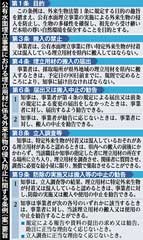
June 13, 2015 Ryukyu Shimpo
On June 12, the Okinawa Prefectural Assembly ruling party submitted to the prefectural assembly office a regulation proposal that would regulate the introduction of foreign species when landfill materials such as dirt, sand and gravel are brought in from outside Okinawa prefecture. This regulation would be used in trying to resolve the issue of an unwanted new military base being constructed in Henoko, Nago City as part of the relocation of MCAS Futenma. Deliberations over the proposal will occur during the assembly’s regular meeting in June. This news was announced at a press conference held at the assembly hall. In addition to requiring businesses involved in the land reclamation to submit notifications and implement measures to eliminate specific foreign species, the regulations will give the Okinawa prefectural government the authority to enter the land reclamation area to conduct surveys, and to prohibit use of dirt and sand in which foreign species have been detected. The regulations would go into effect on November 1, and if the proposal passes, there is a high likelihood that it would have an effect on the new base’s construction in Henoko, which involves plans to bring in huge amounts of dirt and sand from outside the prefecture.
After going to the Assembly Operational Committee on June 15, the proposal will be submitted to the assembly’s regular session in June, which starts on June 16. After that, the Civil Engineering and Environment Committee will consider the proposal, and hearings will be held to obtain opinions from experts. A final decision will be made on July 10, the last day of the current session. Because the ruling party makes up a majority in the prefectural assembly, the legislation is expected to pass.
Prefectural assembly member Mio Nakamura, who was involved in composing the proposal, said she believes implementing the regulations will increase the governor’s authority to prevent the construction of the new military base. She also emphasized the necessity of preventing the introduction of foreign species, an issue that has also arisen in the construction of Naha Airport.
As for the regulations going into effect on November 1, Nakamura said that dirt and sand used in the land reclamation will start being brought to Henoko in early November. She stated; “The actions to be regulated by this law will involve the importation of [materials to be used in land reclamation], so I think this timeline will allow the regulations to be effective.”
At a press conference on June 12, Okinawa Defense Bureau head Kazunori Inoue said he would have to abide by the regulations.
“If enacted, I believe we have no choice but to proceed in accordance with the regulations.”
(Translation by T&CT and Sandi Aritza)
Go to Japanese
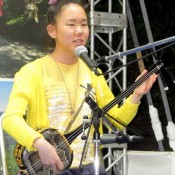
June 9, 2015 Ryota Nakamura of Ryukyu Shimpo
A 15-year old blind high school student fascinated by Ryukyuan traditional music is taking steps towards her dream of becoming a sanshin singer for Ryukyuan dance in Okinawa. In Tokyo, Misuzu Mitoya met a graduate of the Okinawa Prefectural University of Arts who now teaches her sanshin, at an annual Okinawan event held near Mitoya’s home in the capital. She is overcoming the challenges of being a blind person and improving her skills in Utasanshin, or sanshin for songs. Her sanshin dream is coming true, and she aims to study at the Okinawa Prefectural University of Arts as well as pass the Ryukyu Classical Performing Arts Contest.
Mitoya encountered sanshin for the first time three years ago with her father, Atsushi, and mother, Michiko, who are Okinawa enthusiasts. They were at a sanshin workshop held for visitors at the Okinawa Mensore Festa held at Ikebukuro Sunshine City, Toshima District in Tokyo.
She used to learn the piano, but she said she could not play so well. With sanshin as well, she was “almost giving up on learning it at the beginning.”
However, she started picking up the finger plucking slowly. She also started to like Ryukyuan classical music such as “Kagiyade-Hu” and “Binuchi-Bushi” as she could “feel the Ryukyuan history.”
She reached a turning point in her journey last year. Graduates of the Okinawa Prefectural University of Arts who were performing at the Mensore Festa found Mitoya humming Ryukyuan folk song and let her perform with them on stage. Since then she has improved her Utasanshin skills dramatically through lessons with the graduate residing in Tokyo. This year, she “officially” performed on stage at the Mensore Festa with other graduates.
On June 6, she performed “Asatoya Yunta” on stage with the other performers. She also performed “Bashofu” by herself, and her commanding performance amazed the audiences who would not have been able to tell that Mitoya was blind if they had not been told.
Mitoya aims to study at the Okinawa Prefectural University of Arts to further her sanshin training, and she will also enter the Ryukyuan Classical Performing Arts Contest in August.
Thirty-nine-year old Kazuyuki Nashiro from Onna Village, who performed with Mitoya at the Mensore Festa, said, “She has improved since last year. It doesn’t matter whether a music practitioner is blind or not.”
Mitoya who has traveled to Okinawa many times with her parents, says of her passion, “I like the ocean, the breeze, the people of Okinawa and sanshin. I want to study Ryukyu classical music and become a singer for Ryukyuan dance in the future.”
(English translation by T&CT and Sayaka Sakuma)
Go to Japanese
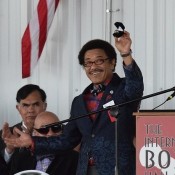
June 15, 2015 Ryukyu Shimpo Sakae Toiyama reports from Canastota, New York
Yoko Gushiken, the former WBA light flyweight champion, was inducted into the International Boxing Hall of Fame on June 15. An Okinawa native, Gushiken holds the Japanese record of 13 world title defenses. The modern International Boxing Hall of Fame (IBHOF) honors boxers, trainers and other contributors to the sport worldwide. On June 14, an award presentation ceremony was held. In front of many audiences, Gushiken delivered a speech in both Japanese and English. He said, “I am really delighted to be inducted into the Boxing Hall of Fame, joining great champions.”
Gushiken became the WBA light flyweight champion in 1976. He surrendered the crown to Mexican challenger Pedro Flores in March 1981 and retired after that fight.
(English translation by T&CT)
Go to Japanese

June 3, 2015 Ryukyu Shimpo
In the forest of Yambaru, Mycena lux-coeli mushrooms (Shii no tomoshibi-dake) light up during the rainy season. Toru Hosonuma, a resident of Motobu, took photos of the mushrooms near the Nago Youth Center in Nago-dake, Nago. About 40 glowing mushrooms, which are about centimeters in height, are growing in groups.
According to the youth center, the mushrooms grow in chinquapin or shii trees. In Okinawa, the mushrooms grow under conditions of high humidity during the rainy season or relatively cool days at the beginning of autumn after continuous rain days. They can be found in Kunigami.
According to Yuichi Oba, assistant processor at Nagoya University Graduate School, these mushrooms grow in Kii peninsula, Kyushu, Izu Islands, and Hachijo-jima but the mechanism for their illumination is not yet known.
Hosonuma said, “I did not expect to see this fantastic scene. I was so glad to see them so close.”
(English translation by T&CT, Hitomi Shinzato)
Go to Japanese
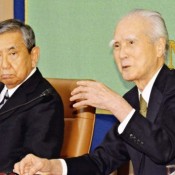
June 10, 2015 Ryukyu Shimpo
On June 9, former Prime Minister Tomiichi Murayama and former Chief Cabinet Secretary Yohei Kono talked about the 70 th anniversary of the end of the war. The talk was sponsored by the Japan National Press Club in Tokyo.
Murayama criticized the Abe administration for forcing through the construction of a U.S. base in Henoko, Nago, as a replacement for Futenma Air Station, even after Takeshi Onaga won the gubernatorial election in November with a pledge to block the plan. The former prime minister said, “The government should not ignore the will of the people of Okinawa.”
Kono said, “I’m very worried [about the situation of Okinawa]. The candidates, who are opposed to the U.S. base construction, clearly won the elections, supported by public opinion. It is very important for the democracy of Japan.”
Muaryama also said, “Okinawa has been sacrificed by the presence of U.S. military even after the war ended. The will of the people, who are opposed to it unanimously, should not be ignored. It is important that the government cooperates with Okinawa’s request in good faith.”
Prime Minister Shinzo Abe plans to make a statement marking 70 years since the end of World War II this summer. Murayama urged Prime Minister Abe to honor the spirit of the ‘Murayama statement’, which was issued in 1995 marking the 50th anniversary of the end of the war. In the statement, then-Prime Minister Murayama expressed remorse and an apology for the country’s past colonial rule and military aggression across Asia.
Kono said the statements upheld by past governments should not be watered down.
(English translation by T&CT)
Go to Japanese
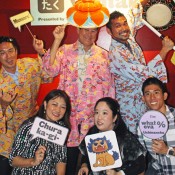
June 7, 2015 Hanae Higa Gushiken, Correspondent of Ryukyu Shimpo
In order to promote activities of the Hawaii United Okinawa Association (HUOA), young Okinawan Hawaiians in their 20s’ to 30s’ have set up a new group called “Shinka.” The group has become the 50th member club of HUOA. Shinka and HUOA co-held their second event, Yuntaku, at a bar in Honolulu on June 2.
Under the theme of interaction, enjoyment, and discovery, the young Okinawan Hawaiians launched the group to promote Okinawan community to young Hawaiians and spark their interest in the activities of Okinawa association of Hawaii. About 150 young people interacted with one another. While members of classical Okinawan music group Afuso Ryu Choichi Kai did sanshin performances, Hawaii Okinawa Creative Arts performed Lion dance. Chinagu Eisa performed eisa dance. These performances seasoned the venue with an Okinawan flavor.
The name Shinka is associated with friend in Uchinaguchi and evolution in Japanese. Second generation Okinawan Hawaiian Lisa Tamaki said that she loves the Uchinanchu community. Tamaki called for the participants to promote the Okinawan community in Hawaii.
HUOA President Mark Higa said that he wants participants to meet many Uchinanchu and make new discoveries.
(English translation by T&CT)
Go to Japanese
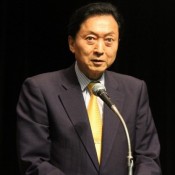
June 6, 2015 Ryukyu Shimpo
At Nago Civic Hall on the afternoon of June 6, the East Asian Community Institute/World YUAI Forum held a symposium to discuss conservation of the natural environment in the Yambaru, Northern Okinawa. The symposium also declared opposition to the plan to move U.S. Marine Corps Air Station Futenma to the Henoko district in Nago.
Former Prime Minister and the administrative director of the institution Yukio Hatoyama delivered a lecture under the theme of “Okinawa as the center and cornerstone of peace in East Asia.” Hatoyama referred to the fact that Prime Minister Shinzo Abe has been strengthening its defense capacity and the Japan-U.S. alliance to counter its perceived threat, China. Hatoyama said, “If Japan sees China as a threat and increases military capability, accordingly China has to do the same, which could make both nations compete in an arms race, creating an environment that leads to war.” He emphasized the importance of bringing peace to East Asia through cultural exchange. Hatoyama stressed the importance of the role Okinawa can play with its geopolitical and historical background.
(English translation by T&CT)
Go to Japanese
June 3, 2015 Ryukyu Shimpo
The Ryukyu Shimpo and the Okinawa Television Broadcasting (OTV) carried out a telephone poll on May 30 and 31 ahead of the upcoming memorial for the 70th anniversary of the end of the Battle of Okinawa.
In the survey, 94.8 percent of respondents said they wanted the experiences of the war handed down to next generation by word of mouth, and 75.4 percent said they want this to happen more often than it does now.
When respondents were asked how the experiences of the war should be handed down to the next generation, 41.2 percent responded; “efforts in schools,” 31.4 percent answered; “people who survived from the war should pass on their experiences through oral history,” and 22.8 percent wanted the governments “to promote peace-related projects.”
Eighty-seven point eight percent responded; “the right to self-determination for Okinawan people should be expanded.” It is speculated that a strong reaction against the governments of Japan and the United States, which are going ahead with the relocation plan despite the will of the people, led to this result.
When respondents were asked whether the government has given enough consideration to its regional development and foreign policies during the past 70 years, 54.2 percent responded; “not sufficient consideration,” and some of these respondents said; “it lacks consideration if anything.” Around 41 percent responded; “it has given sufficient consideration”.
Fifty-eight point six percent responded; “U.S. military bases are not necessary in Okinawa.” As the top reason for their response, 43 percent responded; “the base burden is too heavy on Okinawa”.
Of the respondents, 38.6 percent said; “the U.S. military base is necessary in Okinawa.” Half of these asserted that the reason for its necessity is because it helps protect Japan and the East Asia region.
When respondents were asked about Okinawa’s future, a 66.6 percent majority of them supported the following statement; “it should remain one of the prefectures in Japan,” followed by 21 percent who chose this statement; “it should become a domestic, special autonomous region in Japan.” Respondents who answered; “it should be independent from Japan,” amounted to 8.4 percent.
(English translation by T&CT)
Go to Japanese
June 4, 2015 Ryukyu Shimpo Ryota Shimabukuro reports from Washington D.C.
A collection of books showcasing Okinawan history, culture, politics and arts, called the “Okinawa Collection”, was released at the George Washington University library in Washington City on June 2. The collection project is supported by the Okinawa Prefectural Government and part of efforts to create a center of Okinawan Studies in the capital, Washington, in order to deepen people’s understanding on Okinawa.
The collection includes 300-400 books on Okinawa-related topics such as prefectural history, culture, arts, and military base issues. The books were donated by the Okinawa Prefectural Government and Professor Mike Mochizuki, who has been studying the Okinawan issue for a long time at George Washington university.
The project’s budget for 2014 was 2 million yen, and 8 million yen for 2015. The allocated money will be used to purchase and translate books, as well as manage the collection.
Governor Onaga attended the opening ceremony on June 2, while on his diplomatic trip to Washington, to celebrate the establishment of the collection. “I hope this will lead many more people to be interested in Okinawa and to deepen their understanding of Okinawa,” he said.
Professor Mochizuki emphasized the importance of the collection, stating, “Okinawa is becoming a window through which we can understand the US-Japan relationship and build relationships in the Asia-Pacific area.” Vice Provost for Libraries at the George Washington University, Geneva Henry, also spoke at the gathering. He said; “this opportunity is beneficial for government officials as well as scholars.”
(English translation by T&CT and Sayaka Sakuma)
Go to Japanese
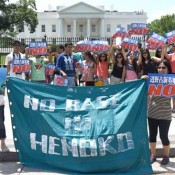
June 3, 2015 Ryukyu Shimpo Ryota Shimabukuro reports from Washington D.C.
On June 1, Okinawans living in the U.S. gathered in front of the White House and showed their objection to new military base construction in Henoko. The demonstration was timed to coincide with Governor Onaga’s visit to Washington D.C, where he requested a review of the Henoko relocation plan. Protestors held a banner, which read “protect the ocean”, attracting the attention of onlookers. Some passersby expressed their sympathy and held the banner with the Okinawans, while others offered future cooperation.
The demonstration, named an “Okinawa Peace Appeal in Washington D.C.”, was arranged by Noriko Heller, who is originally from Nakijin and lives in New Jersey, Rachel Clerk who is from New Jersey and assisted Mayor Inamine as an interpreter, and Yoshiharu Higa who is based in New York.
From June 1-June 3, they demonstrated every day from 11 am to 3 pm. The organizers also asked citizens’ groups and people who are interested in Okinawan issues to participate in the demonstration. Professor Emeritus at Brown University, Steve Rabson, who is one of the international intellectuals supporting Okinawa’s struggle to oppose the Henoko landfill attended the demonstration.
Paul Ceaser, a citizen who was visiting Washington D.C. from Vermont, stopped and listened to Ms. Heller and Ms. Clerk. He said, “The U.S. military occupies many places in the world and destroys the environment. Military funding should be used for welfare instead. A senator from my state will enter the presidential election next year. I would like to appeal to him on this issue.” Then he joined the protestors and held the banner with them.
(English translation by T&CT and Megumi Chibana)
Go to Japanese
June 5, 2015 Ryukyu Shimpo Sakae Toiyama reports from Washington D.C.
On June 3, Governor Takeshi Onaga, wound up his campaign in Washington, D.C, where he has been petitioning leaders to cancel the plan to build a new military base in Henoko, Nago City and immediately close and return Futenma Air Station.
At a press conference there, Governor Onaga summarized his visit, saying that the meetings had deepened U.S. government officials’ and political and security experts’ understanding of Okinawa’s stance. He stated, “Compared to before our visit, I think great strides have been made. I want to build on those achievements and keep moving forward step by step.” He reaffirmed his determination to prevent the base relocation.
However, after Governor Onaga met with U.S. State Department Office of Japanese Affairs Director Joe Young and Acting Deputy Assistant Secretary of Defense Cara Abercrombie, the U.S. State Department released a statement declaring their commitment to moving forward with the Henoko relocation.
Governor Onaga claimed his trip to the U.S. was a success emphasizing that “because the U.S. and Japanese governments say that ‘Henoko is the only option,’ many people believe there is no doubt that they will be able to build the base, but the truth is, the relocation work has failed to move forward up until now for many reasons, and I gained their understanding regarding this point.” Governor Onaga reiterated his intention to be persistent in continuing direct negotiations with the United States, mentioning that he agreed with the U.S. Senate Armed Services Committee Chairman John McCain to continue their discussion of the issue.
The U.S. State Department statement declared that “the governments of the United States and Japan share an unwavering commitment to the construction of the Futenma Replacement Facility (FRF)…The plan to construct the FRF is the only solution that addresses operational, political, financial, and strategic concerns.” The statement also emphasized that the relocation plan constitutes relocation within the current Camp Schwab facility, stating, “The FRF is not a new base; rather, the United States and Japan are adding capabilities to an existing base.”
(English translation by T&CT and Sandi Aritza)
Go to Japanese








 Webcam(Kokusai Street)
Webcam(Kokusai Street)


